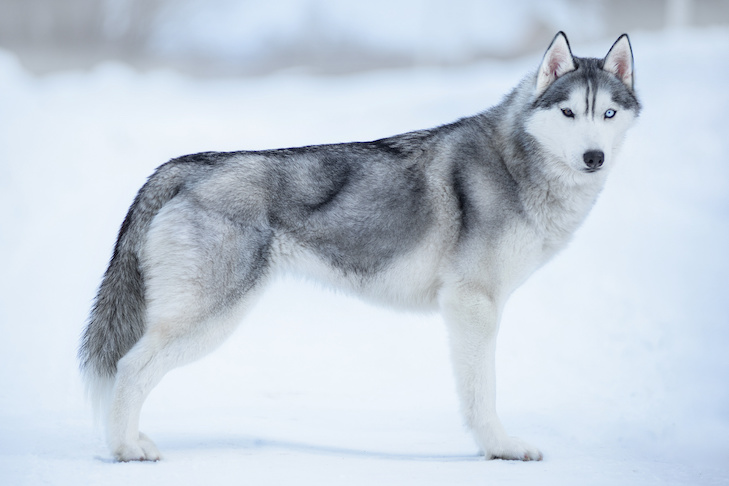No products in the cart.
Dogs Breeds
Siberian Husky Dog Breed Information
The Siberian Husky is a medium-sized, Spitz-type dog breed that originated in northeastern Siberia, Russia. They were bred by the Chukchi people for use as sledge dogs and were brought to Alaska during the Nome Gold Rush in the early 1900s.
Appearance:
The Siberian Husky is known for its thick, fluffy coat, which comes in a variety of colours, including black, white, grey, and various shades of red and copper. They have a distinctive “mask” of black fur on their face and blue or brown eyes, or one of each eye colour, which is called heterochromia. They are a medium-sized breed, weighing between 35-60 pounds and standing 20-23.5 inches tall.
Temperament:
Siberian Huskies are known for being friendly, outgoing, and playful. They are not typically aggressive but can be stubborn and independent. Siberian Huskieshave a strong prey drive and should be kept on a leash or in a securely fenced area to prevent them from chasing after small animals. They are also known for being highly energetic and need regular exercise and mental stimulation.
Health:
Siberian Huskies are generally healthy and hardy dogs, but they are prone to certain health issues, such as hip dysplasia, cataracts, and certain types of cancer. Regular vet checkups and a healthy diet can help prevent these issues.
Exercise:
Siberian Huskies are high-energy and active dogs that require a lot of exercises. They love to run and play, and they enjoy participating in activities such as sledging, skijoring, and agility. They also need a lot of mental stimulation and should be provided with plenty of toys and interactive games to keep them engaged.
Is a Siberian Husky a good family dog?
Siberian Huskies can make good family dogs, but they do have specific characteristics and needs that should be considered before getting one.
Huskies are known for their energy, independence, and strong will, which can make them challenging to train and manage. They also have a strong prey drive and may chase after small animals if not properly trained. Additionally, they have thick coat which requires regular grooming.
Huskies are also known for their strong desire to roam and explore, which can make them prone to wandering off if not kept in a securely fenced yard or on a leash. They also have a high endurance level and require a lot of physical exercises, such as daily runs, to stay healthy and happy.
However, if you are willing to put in the time, training and patience to train a Husky, they can be a loving and playful addition to a family. They are affectionate with their owners and can be good with children and other pets if they are properly socialized from a young age. They are also known to be good watchdogs, as they will bark to alert their owners of any strangers.
It’s important to research the breed and understand its characteristics and needs before getting a Siberian Husky and to make sure that you are able to provide them with the proper training, socialization, exercise, and care they need.
What To Feed a Siberian Husky?
Siberian Huskies are a large, active breed of dog and have specific nutritional needs that should be met in order to keep them healthy and happy. Here are some guidelines for feeding a Siberian Husky:
- Quality food: Feed your Husky a high-quality, well-balanced diet that is appropriate for their age, size, and activity level. Look for a food that is formulated for large breeds and contains meat as the first ingredient. Avoid foods that contain fillers, by-products, or artificial preservatives.
- Protein: Siberian Huskies require a high-protein diet as they are very active and need the energy to keep up with their exercise needs. A diet that contains at least 18-25% of protein is ideal for them.
- Fat: Fat is an important source of energy for huskies, and a diet that contains at least 8-15% of fat is ideal.
- Carbohydrates: Carbohydrates provide energy and help regulate blood sugar. Look for a diet that contains complex carbohydrates, such as brown rice, oats, and barley.
- Supplements: Some huskies may require additional vitamins, minerals, and fatty acids to maintain optimal health. Consult with your vet if you suspect your Husky has a deficiency in any of these areas.
- Portion Control: It’s important to measure the food and give it to them in the right quantity; overfeeding can lead to weight gain and obesity, which can lead to many health problems.
- Freshwater: Always provide your Husky with fresh, clean water at all times.
It’s important to keep in mind that each dog is unique, and feeding needs may vary depending on an individual dog’s size, age, activity level, and health status. It’s always best to consult with a veterinarian for guidance on the best diet for your individual dog.
Siberian Huskies are a beautiful, friendly, and energetic breed that makes a great companion for active families or individuals. They can be great with children and other pets, but they do require a lot of exercise and attention. They are also known to be escape artists, so they should be kept in a secure area or on a leash to prevent them from running away. Training and socialization from a young age are important to prevent any unwanted behaviour from developing.

